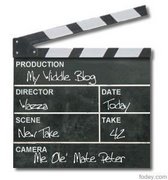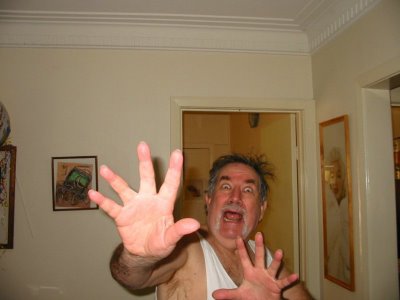Richard Widmark, Another Great Legend Gone.

Those who read my blog would be aware that I am a bit of a
movie buff. I have done a number of posts on movie stars.
Another great movie star of yesterday, Richard Widmark has
moved onto that big movie studio in the sky.
I have followed Richard’s career since “Red Skies of Montana”
in 1952. I was 12 years old and my mother who loved movies
had taken me to see this film. The next film I saw was “Don’t
Bother to Knock” with a young Marilyn Monroe. I later saw
his first film “Kiss of Death” and “Panic in the Streets” on TV,
and I was rapted in Richard’s acting style as he had such
a strong personality on the screen.
Whenever a new Richard Widmark came out I would soon
be at the cinema eager to see his new film. Richard Widmark, the actor who gave cinema one of its
Richard Widmark, the actor who gave cinema one of its
greatest villains with his performance as Tommy Udo in
the film noir classic 'Kiss of Death', has died. He was 93.
The actor, who was Oscar-nominated for his role as Udo,
passed away on Monday 24th March at his home in Connecticut.
Born in Minnesota in 1914, Widmark had intended to become
a lawyer but changed direction when he performed in plays in
college. Among his other famous films were 'Pick Up on South
Street', 'Night and the City', 'Broken Lance', 'The Alamo' and
'How the West Was Won'. He is survived by his wife Susan,
whom he married in 1999, and daughter Anne from his first
marriage to the late writer Jean Hazelwood.
Before he was a movie star, Widmark was a movie buff.
When he was four, his Scottish grandfather started taking
the toddler to silent films, and he became a great fan of
star Boris Karloff. As a teen, Widmark could smooth-talk
his way out of trouble. He was elected class president in
high school, and his intent was to become an attorney.
When his college announced plans to stage Counsellor at
Law, a then-popular play about a lawyer, the brash
Widmark auditioned for the lead. He won the role, and he
knew on opening night that playing a lawyer was more
enjoyable than being one, so he decided to become an
actor instead.
Widmark was born on Dec. 26, 1914 in Sunrise, Minn.,
and grew up in Princeton, Ill. As a child he appeared in
three of the Our Gang series (I never knew that) before
leaving acting to return to his studies. He attended Lake
Forest College, north of Chicago, where he first took an
interest in acting. After he graduated in 1938, Widmark
taught acting at the college. Subsequently, he landed a
radio job in New York on a show titled "Aunt Jenny's Real
Life Stories" and made his Broadway stage debut five
years later in "Kiss and Tell" (1943). Because of a
perforated eardrum, Widmark dis not serve in World War II.
Four years later in 1947, he got his big movie break when
he was cast as the psychotic Tommy Udo in "Kiss of Death."
He then signed a seven-year contract with 20th Century Fox.
His early films included performances in a number of bad-guy
roles in such fare as "Road House" (1948) with Ida Lupino
and Cornel Wilde. He was particularly chilling as a nasty racist
in "No Way Out" (1950), constantly goading a young intern
played by Sidney Poitier.
Richard Widmark in his first film role "Kiss of Death"
Rejected by the Army because of a punctured eardrum,
Widmark began appearing in Broadway plays in 1943.
His first was a comedy hit "Kiss and Tell." He was appearing
in the Chicago company of "Dream Girl" with June Havoc
when 20th Century Fox signed him to a seven-year contract.
He almost missed out on the "Kiss of Death" role.
Widmark's first movie appearance was in 1947's "Kiss of
Death", as the giggling, sociopathic villain Tommy Udo.
His most notorious scene in the film found Udo pushing a
wheelchair-bound old woman (played by Mildred Dunnock)
down a flight of stairs to her death. "Kiss of Death" was
a commercial and critical success, and started Widmark's
seven-year contract with 20th Century Fox.
He was nominated for the Academy Award for Best
Supporting Actor and won the Golden Globe Award for
New Star Of The Year - Actor for his performance.
Two scenes from "Kiss of Death" and with co-star Victor Mature.
Director Elia Kazan cast Widmark in his thriller "Panic in
the Streets" (1950) not as the heavy - that role went to
Jack Palance - but as the physician who tracks down
Palance, who has the plague, in tandem with detective
Paul Douglas. Widmark was establishing himself as a real
presence in the genre that later would be hailed as "film noir".
Widmark, who was usually associated with villainous roles,
played another heavy in the film noir "Road House" the
following year. Yet he made his mark as the cynical hero
of Samuel Fuller's "Pickup on South Street" in 1953.
His gritty persona also suited him well for Westerns,
playing in such John Ford Westerns as "Two Rode Together"
and "Cheyenne Autumn." He played the title role in the New
York cop story, "Madigan" (1968) for director Don Siegel.
Throughout his career, Widmark was especially gifted in
showing the psychological cracks and ticks of otherwise
solid authority figures.
This is a screen "dump" of the title from his screen debut.
(altho' this is not Richard in the photo).
During a interview Richard laughed when he talked about
this film — and the famous scene in which he pushes
wheelchair bound Mildred Dunnock down a flight of stairs.
“You make 50 fifty movies over a lifetime and that’s the one
they remember you for,” he chuckled.
He told me that he never had “a great movie” but I differ.
He had several: “Night and the City,” “Pick up on South
Street,” “The Street with No Name,” and “No Way Out”
are all classics.
Here are a couple of things he told during a interview:
Karl Malden was his oldest friend. They’d met in 1938 doing
radio work. About his contemporary Robert Mitchum:
“I liked old Bob but he was a real bull shitter. We were in
different worlds. He was in the booze world.”
Bette Davis, he said, was “tough.” Marilyn Monroe
“was a ding dong.' I liked old Marilyn.
No one could get her out on the set.”
He told an interviewer in later years on Marilyn Monroe:
"She wanted to be this great star but acting just scared
the hell out of her. That's why she was always late - you
couldn't get her on the set. She had trouble remembering
lines. But none of it mattered. With a very few special
people, something happens between the lens and the film
that is pure magic. ... And she really had it."
Widmark was at his best with characters that had a steely
edge. He played a range of these types in a number of genres,
including the war story "Halls of Montezuma," the romantic
comedy "Tunnel of Love" and the Westerns "Yellow Sky"
and "Broken Lance."
His seven-year contract at Fox was expiring, and Zanuck
- who would not renew the deal - cast him in the Western
Broken Lance (1954) in a decidedly supporting role, billed
beneath not only Spencer Tracy but even Robert Wagner
and Jean Peters. The film was well-respected, and it won
an Oscar nomination for best screenplay.
Richard and The Duke "John Wayne" from "The Alamo".
During the late 1950s, he began to produce films under
his own banner, Heath Prods. Widmark also performed in
"Judgment at Nuremeberg" and "The Bedford Incident".
Perhaps Widmark's finest performance came in "The Bedford
Incident", a very effective thriller, now generally-forgotten.
As the stern commander of a US Navy destroyer on cold war
patrol, Widmark's crew detects a Soviet submarine in the
frigid waters of the Atlantic Ocean, and pursues the enemy
vessel with dogged determination. In addition to starring,
Widmark also produced the film, because he liked its
ominous anti-war message.
If you haven’t seen “The Bedford Incident” I recommend
you go out and purchase this on DVD as this shows Richard
Widmark at his acting best.
Widmark appeared in two Westerns directed by John Ford
with co-star James Stewart in "Two Rode Together" (1961)
and as the top star in Ford's apologia for Indian genocide,
"Cheyenne Autumn' (1964). On "Two Rode Together",
Ford feuded with Jimmy Stewart over his hat. Stewart
insisted on wearing the same hat he had for a decade of
highly successful Westerns that had made him one of the
top box office stars of the 1950s.
Appearing in the better part of 100 movies over a career
that spanned 50 years, Richard Widmark although not a
"superstar" on his own, he played supporting roles
alongside the biggest names there ever were: with John
Wayne in "How The West Was Won" and "The Alamo",
Gregory Peck and Anne Baxter in "Yellow House", Spencer
Tracy and Burt Lancaster in "Judgement at Nuremberg" or
holding Marilyn Monroe in his arms in "Don't Bother To Knock".
In 1961, Widmark acquitted himself quite well as the
prosecutor in producer-director Stanley Kramer's
"Judgment at Nuremberg" (1961), appearing with
the Oscar-nominated Spencer Tracy and the Oscar
winning 'Maximilian Schell', as well as with superstar
Burt Lancaster and acting genius Montgomery Clift
and the legendary 'Judy Garland' (the latter two
winning Oscar nods for their small roles). This was
also a superb fim and if you haven't seen it it's worth
going out and getting it on DVD.
............Richard in the role from "Judgment from Nuremberg"
Widmark continued to co-star in A-pictures through
the 1960s. He capped off the decade with one of his
finest performances, as the amoral police detective in
Don Siegel's gritty cop melodrama "Madigan" (1968).
Watching "Madigan", one can see Widmark's characters
as a progression in the evolution of what would become
the late 1960s nihilistic anti-hero, such as those embodied
by Clint Eastwood in Siegel's "Dirty Harry".
I remembered watching the TV series Richard made
from the movie “Madigan” and he was just as superb
in the only six 90 minute episodes that were made as a
spin off from the movie.
Richard Widmark from the movie "Madigan"
In later years, Widmark appeared sparingly in films
and TV. He explained to Parade magazine in 1987:
"I've discovered in my dotage that I now find the
whole moviemaking process irritating. I don't have
the patience anymore. I've got a few more years to
live, and I don't want to spend them sitting around a
movie set for 12 hours to do two minutes of film."
 Richard Widmark poses on the balcony of the
Richard Widmark poses on the balcony of the
Widmark was married for 50 years to the same woman,
his beloved Jean Hazelwood. He lost the desire to act
when his wife of more than fifty years, became ill in the
early 1990s. Two years after her 1997 death, he married
Susan Blanchard, the stepdaughter of Oscar Hammerstein
and ex-wife of Widmark's longtime friend Henry Fonda.
Widmark’s last film was “True Colors” in 1991.
After that, he didn’t see the need to continue.
His favorite actors? “Spencer Tracy, Henry Fonda and
Jimmy Stewart. I’d go back to work if I could work with
those guys. I loved them.”
There’s not many stars of yesteryear left and I’m glad
I’ve lived through the 50 and 60’s to see, watch and
enjoy the performances of these great stars both male
and female who helped to lighten up our lives on the big
screen. Although Richard Widmark has not acted for
some years his performances will be around for years to
come to watch on DVD. Thanks Mr. Widmark for giving
many of us your winning performances.
Click on the video to see part of “Kiss of Death”





































